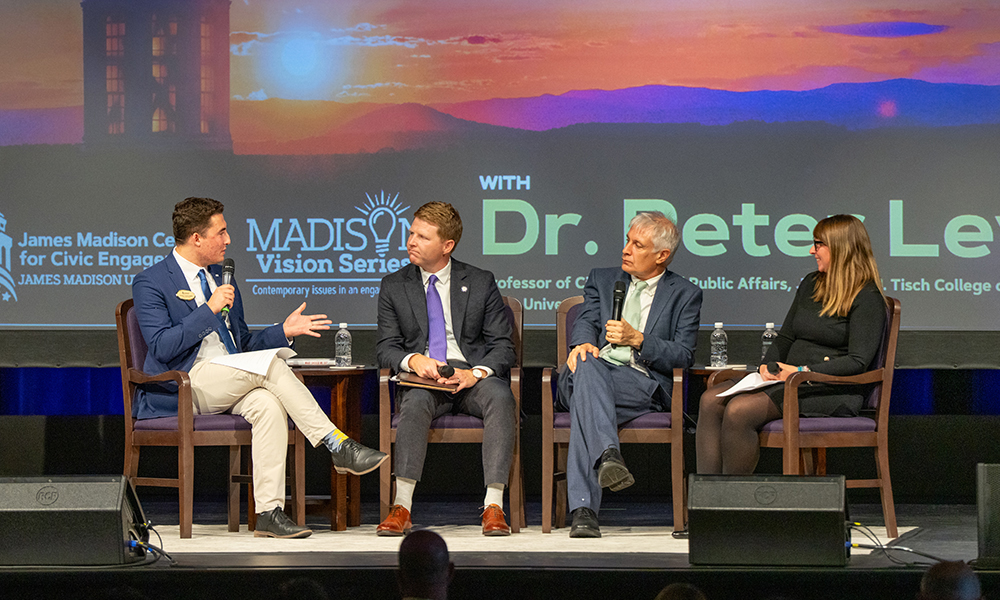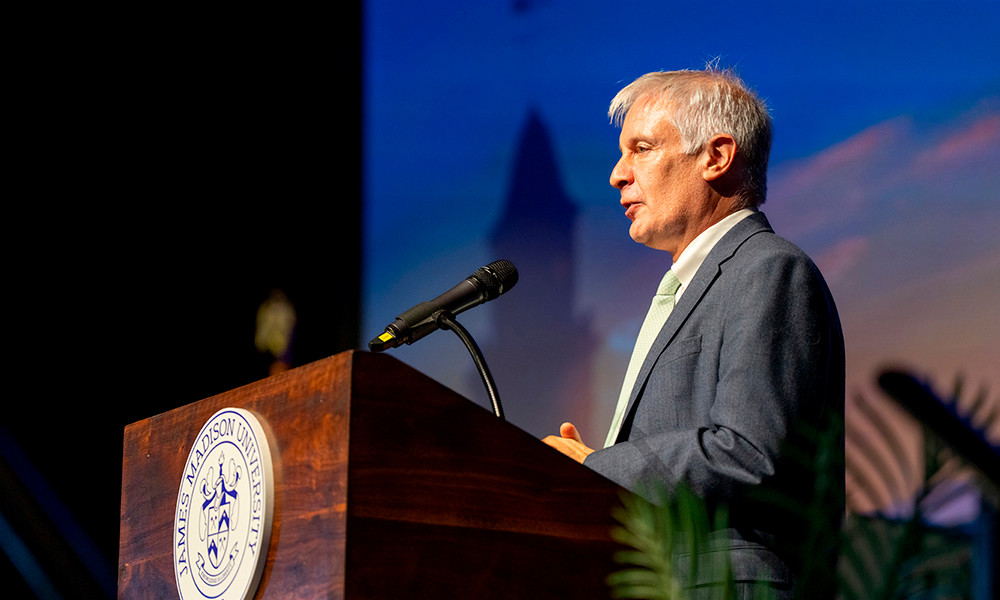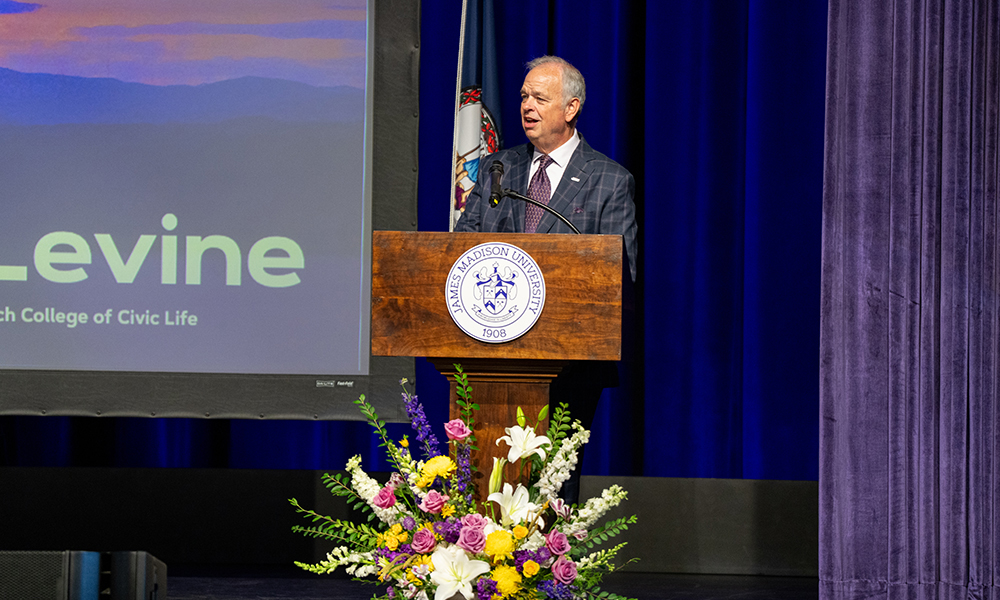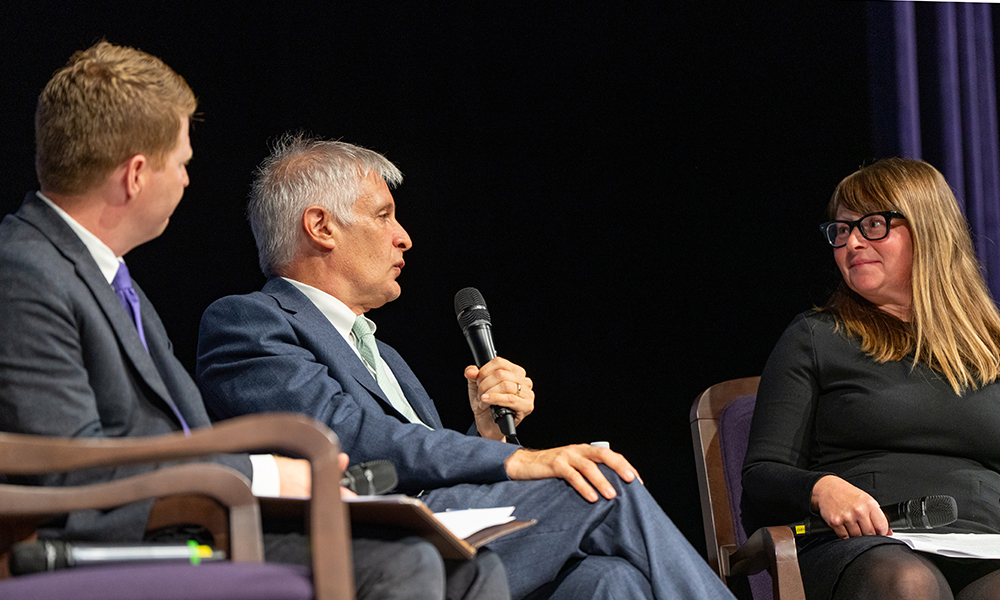Leading voice in civic studies speaks at Constitution Day event
Featured Stories
SUMMARY: As part of the Madison Vision Series, Dr. Peter Levine, an internationally recognized pioneer in civic education and democratic renewal, spoke about how people can effect change by asking themselves key questions like "What should we do?" This question depends upon people working together instead of trying to go it alone. Forming cohesive groups also inspires others to join social movements.
Hear more episodes and subscribe to the podcast at the Being the Change podcast page.
Speaking about civic engagement at a Sept. 8 Constitution Day event in Wilson Hall, Dr. Peter Levine said that communication and self-examination are two major factors in helping effect change.
Those seeking change on a broad scale often have questions about what should happen and who should do it, Levine said. He titled his most recent book for the key question he recommends asking: What Should We Do? A Theory of Civic Life.
“It’s only four words: What should we do?” he said. In his book, he defines this as “the question of civic life.” It’s a question he said anyone who wants to be involved in civic life should be serious about answering for themselves.
“That’s your diagnosis,” he said. “Are you seriously asking that question, with other people?”
The “we” in his question is key, he said, because it enables people to work with each other at the group level to effect far more change than they can working alone.
“By myself I can’t accomplish very much and by myself I have very narrow perspectives, so I need to be in groups,” Levine said. “I could also ask, ‘What should I do,’ and that’s sometimes a relevant question, “but ‘What should we do?’ is really much more powerful.”

An internationally recognized pioneer in civic education and democratic renewal, Levine visited JMU for a fireside chat hosted by the Madison Vision Series. The Lincoln Filene Professor of Citizenship and Public Affairs at Tufts University discussed the role of civic life in democracy and higher education ahead of Constitution Day, which is Sept. 17.
Leading the discussion were Dr. David Kirkpatrick, vice president and chief of staff at JMU, and Dr. Kara Dillard, executive director of the Madison Center for Civic Engagement.
Kieran Fensterwald, a Democracy Fellow with the Madison Center for Civic Engagement, was invited to be part of the fireside chat. Fensterwald is a senior political science major, with pre-law and civic leadership minors, and is speaker of the Student Government Association.
Other student democracy fellows asked their questions before audience members were invited to participate in a Q&A session.
“Dr. Levine is a leading voice in civic studies and youth civic participation,” JMU President Dr. James C. Schmidt said during his introduction. “His work reminds us that real change happens when people come together to solve problems in their communities.”

Levine developed an interest in civic engagement after graduate school when he moved to Washington, D.C., and for a couple years worked for the organization Common Cause, which seeks to clean up government by focusing on anti-corruption measures.
At the time, he was thinking, “We need to make society better, government is part of that ... and in order to get better results for society, we need a better government,” Levine said. “So I’m going to go to Washington and advocate for a better government.”
Though Common Cause had grown to about 240,000 active members in the 1970s and largely retained them through the mid-1990s, Levine said membership started declining rapidly as its members became too old to participate and new members weren’t taking their place. He left the group, but in realizing that active citizens are essential for cleaning up government, he continued to pursue and educate on civic change.
“The whole rest of my life, since the mid-90s, I've only been working on one thing, which is trying to have responsible, effective, active citizens in America on the basis that if we don't have that, we'll never have a good society, because we'll never have a government that works well,” Levine said.
One of his goals as an educator is teaching young people how to be active and effective citizens, which includes influencing and encouraging testing for K-12 civic education.
“It doesn't stop with students and schools, though. For one thing, we’ve got a whole bunch of people who are done with school and are still out there in our society and will be there for decades, so we have to work with them too,” he said. “A lot of what I’ve been thinking about is the techniques and methods that people use at any age to manage and run organizations — to found, start, launch and preserve organizations — and can we make those better?”

Levine helped found the Center for Information and Research on Civic Learning and Engagement, the premier nonpartisan, independent research organization focused on improving skills and knowledge that youth need to meaningfully participate in civic life. He also leads the civic studies major at Tufts University, the first academic program of its kind in the world.
His latest book, What Should We Do? A Theory of Civic Life (Oxford University Press, 2022), is already considered a definitive work on how communities can bridge divides and act together for the common good.
Though Levine advocates for working in groups rather than alone, he cautioned that groups can fail to inspire their members and risk driving people away. This can be beneficial, if a drastic drop in membership encourages groups to change and become better. But he also urges people to stick it out, if they can, and challenge themselves to learn from those who share differing points of view.
“Groups can improve if people do start walking,” he said. “But I think you have to be not too quick to leave. Because, one, you might be wrong. ... But also, because the group itself is the mechanism for asking ‘What should we do.’ So, if you leave it, you just lost that mechanism. ... We don’t want people just exiting; we want people engaging.”
He also advises groups to examine how they can encourage discussion without driving people away.
“I ask students to share in responsibility for whether the other students are going to want to come back,” he said. “We know that people want to be here, more or less. ... And you can't tell from just looking at them. It's not a demographic thing; it's personal and it can vary. But you can't really learn if you don't want to be there at all, and although we do want to have some difficult conversations, people need to want to be here. So you’re responsible for making the other people want to come back.”
The fireside chat is available on YouTube.
